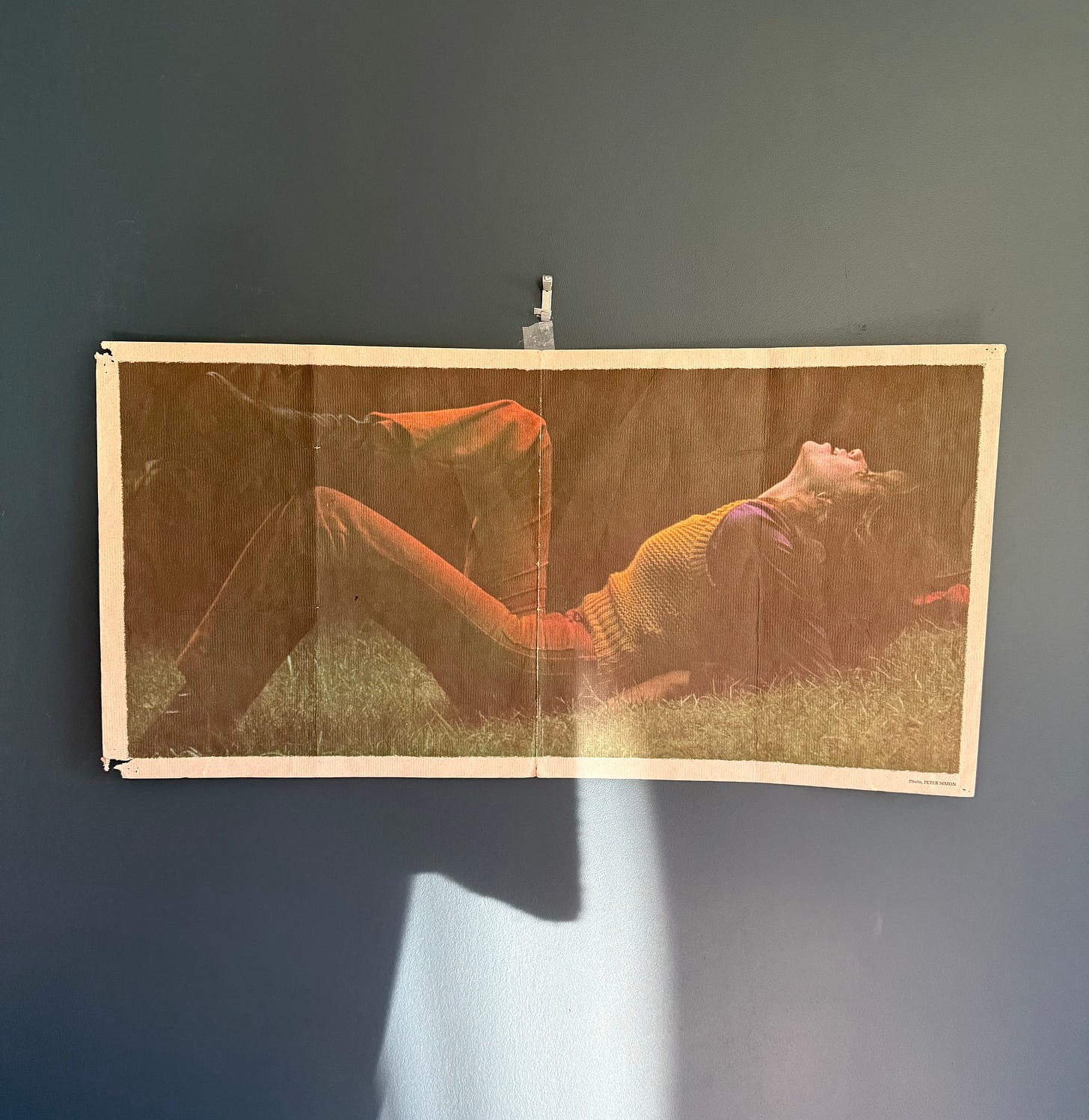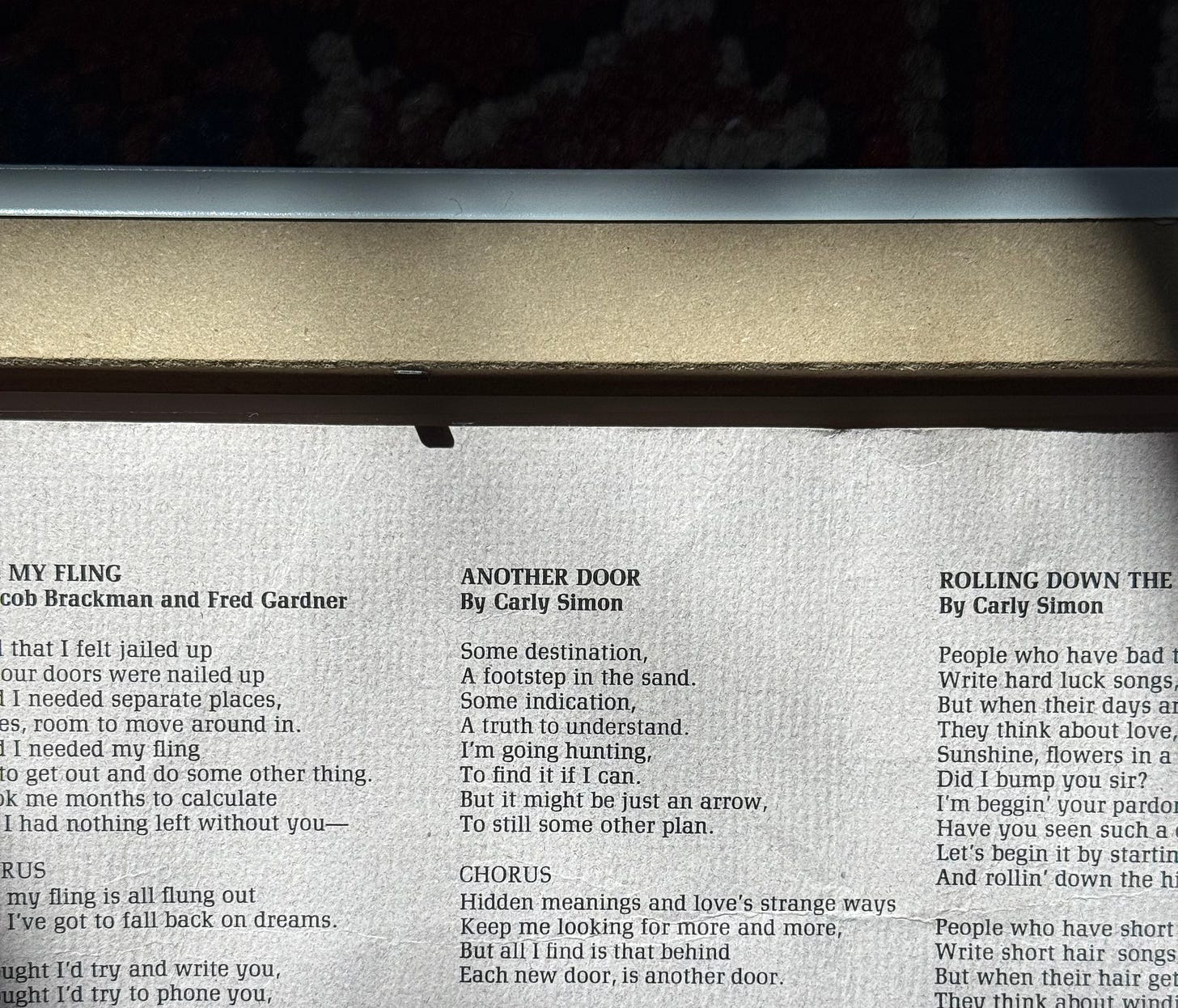I have a framed picture of Carly Simon hanging in my office. It’s a folded print that my close friend Amelia gave me in my early twenties, when I was going through a hard time (think: the Stephen DeMarco era). The picture remains one of my most cherished possessions. In it, Carly lays horizontal on the grass, leaning back on her forearms with her chin tipped up towards the sky. There’s an optimism to her posture, a fearlessness I’ve always admired.
Back then, Amelia had mailed me the print and included a note—I wish I’d saved it—which said something along the lines of: this is to remind you to be a strong, independent woman, like Carly!
The print has stayed with me over the years, tacked on the walls of the various apartments where I lived in New York and Colorado in my twenties. I finally put it in a frame when my husband and I moved into our house just before 2020. Looking at this picture of Carly never fails to shift my mood, to embolden me—a symbol of carefree confidence and something life-affirming. Perhaps most of all it reminds me of Amelia—a best friend who was there during a hard stretch, who believed in me when I couldn’t figure out how to believe in myself.
Five years later, Carly shines down on me from her corner perch in my office. The past five years of writing have been a whirlwind—lots of ups, a few downs. And even though it’s hard to feel anything but gratitude for a career that has given me so much—a career in which I’ve been on the receiving end of a stupid amount of luck—I want to talk about the way writing has been difficult lately, because that’s my current reality.
A couple of weeks ago, I received some tough feedback regarding Book 5, the novel I began drafting in May of 2023. It’s a book I’m writing because I want to, but that doesn’t take away from the fact that I’m contracted by my publisher for another novel. And while I’m overwhelming grateful to have a contract—because it means I have a job—it also adds pressure to the creative process.
The practice of cranking out Book 5 has been a slow drip, which I could’ve anticipated. When I began working on the draft, my son was two and a half and my daughter was nine months old. Nearly two years later and you can do the math, but writing a novel with a baby who’s grown into a toddler and a toddler who’s grown into a kid in preschool has felt, at times, like a kind of test. The transition from one to two children hasn’t been easy for my husband and me. It’s a transition that’s rocked our world, that some days feels like it’s only getting harder when I’m often told that it should be getting easier.
I love to write—the expansion and peace writing has brought to my life is immeasurable—but over the past year I can’t count the number of mornings I sat down at my computer and stared at the blinking cursor in front of me, thinking: I don’t want to do this. My brain doesn’t have space for this. There isn’t language for the way I love my children, but trying to write a novel and parent them in tandem—even with the privilege of childcare—has flipped my process on its head. I can’t figure out how to do it without stretching myself thin, on the verge of breaking. I always need more time. My mind is constantly robbed of stillness, of clarity, of intention.
For example: during the twenty-one-month period that it took to write the first draft of Book 5, I never once told my agent or my editor what the novel was actually about. Why on earth not? Motherhood is a theme, was all I said, vaguely. And it gets dark. I’d been adamant about keeping the plot to myself because I’d wanted them to be surprised. I’d wanted to test the effectiveness and placement of the twists. I never paused to think through the risks of this omission; I was too focused on plowing ahead, on moving forward.
Last December, when it was clear I wouldn’t make my end-of-year deadline, my husband offered to hold down the fort with the kids so I could stay at my parents’ house in Vermont for three extra days after New Year’s and have a stretch of uninterrupted time to work. That time was invaluable, and I made so much progress, but I still had a way to go when I got home. My deadline had come and gone; my publishing team was more than understanding but I told myself I’d get the draft in by the end of the month, if only for my sanity. I spent every night in January in my office after the kids went to bed. I didn’t watch TV or read or talk to my husband, and it wasn’t easy to give up that three-hour block between my kids’ bedtime and my own—the only free window a parent of young children has all day. I worked on the draft until my vision blurred. Until, on January 29th, it was finally, mercifully done.
That same day, I emailed the manuscript to my agent and exhaled a sigh of relief as the file spun off into the cloud. Writing a book is hard, no way around that, but this one had taken a toll. On my mental health. On my kids. On my marriage—the tit-for-tat dynamic that had escalated because of the constant battle for more time to work.
My agent read Book 5 quickly, which I took as a good sign, but she had notes. I spent the next few weeks working on a revision, and then the manuscript was finally ready to go to my editor. I was full of nerves. My editor and I are close, and I’ve never submitted a book that she hasn’t felt was in relatively decent shape. But as I waited to hear back from her, I began to doubt myself. I thought more honestly about my agent’s feedback, which had contained a general degree of concern I hadn’t wanted to face. And it wasn’t just my agent—I knew Book 5 dealt with some polarizing material. Perhaps I’d simply been writing the book for so long that I’d become anesthetized to its potential triggers. For a week, I waited. I fought off the doubt and convinced myself that everything would be fine.
It was the middle of a Thursday afternoon when my phone lit up with a text. I was on the floor, using a butter knife to remove stubborn red putty from the fibers of our living room carpet (side note: don’t buy TheraPutty for your kids; it sneakily stains everything). I glanced at my phone to see a message from my agent. She’d written that my editor had finished reading Book 5, and asked if we could talk on the phone. I can’t explain how I knew in that moment, but I did. A pit of dread formed in my stomach.
Our phone call lasted for twenty minutes that are foggy, even in my recent memory. But the takeaway was clear: my team felt that Book 5 contained a fatal flaw, specifically pertaining to the degree of darkness of the plot. A portion of the novel—I didn’t yet know how much—would need to be scrapped and reworked.
For a disorienting moment, I felt like I was dreaming. Like it couldn’t be real. And then something broke open inside of me, some tight coil of hope I’d been spinning since May of 2023. The shame and anxiety were crushing; eventually, they crystallized into defeat. I felt numb and exhausted, rattled by the possibility that I’d wasted nearly two years’ worth of time and energy—time and energy I’d had to fight for. The tears came from a place of subconsciousness, and I felt like a child, unable to stop myself from sobbing uncontrollably into the phone.
I’m tempted to label my reaction as dramatic but that feels reductive and not quite fair to the me of that moment, even if my perceived sense of doom has lessened in hindsight. Regardless of the fact that I chose to keep this novel close to the vest, the extended solitary nature of writing it had me tightly wound; this kind of feedback was always going to knock me back on my heels.
Later that day, I texted my two closest writer friends to share what had happened.
Send us the draft, we’ll help you brainstorm, Avery and Colleen wrote back. This could be salvageable.
As any writer knows, when you’ve been alone with your manuscript for a long period of time, having other people read it is 1) terrifying and 2) the most helpful thing on earth. I sent Avery and Colleen the manuscript on Thursday evening, and they were both finished by Sunday, a fact that floored me because I’m a slow reader—especially during this season of life—and both of these women are in the thick of it with small children and busy careers. But they carved out time to do this for me. They shared what they loved about the book, and what they could see wasn’t working. Their feedback was unvarnished and exactly what I needed to hear, and the gratitude I felt was dizzying. It was like looking at the picture of Carly Simon in my office and remembering the way Amelia had cheered for me when I was on the ground. The way she’d held me. The way friendship, all my life, has held me.
When I was drafting Bye, Baby in 2021, I went to visit my sister in California and watched Working Girl on the plane. The theme song of that movie—Carly Simon’s “Let the River Run”—will always remind me of that trip, and it made its way into a chapter of Bye, Baby. It’s become a favorite song and now my four-year-old loves it, too—he asks me to play it regularly, and it’s a big step up from Blippi’s Excavator Song, let me tell you.
Let the river run. Letting the river run is trusting the process, and that’s my new plan, even if I don’t like the triteness of the way it sounds.
I’m tired; aren’t we all? The world is on fire and lately I just want to rest and read fiction and cuddle my children. Part of me is daunted by the scope of the work ahead, and yet, I know there is a river that runs below the surface, an invigorating current that will pull me under once I dip my toe in. In a matter of days or weeks, I’ll be absorbed back into the manuscript, committed to the revision. I’ll stay there.
Stay there.
The morning after my agent called, I dragged myself to a yoga class. The teacher cued us into an uncomfortable squat, where we bent our knees and lowered ourselves, slowly, towards the floor.
Stay there, the instructor said, a bright smile filling her face, which glistened with healthy sweat. We hovered above the ground and my thighs trembled, burning, the muscles begging for release.
Stay there, the teacher repeated, before reminding me of what I knew deep down, a truth I’d almost forgotten. The place where there’s discomfort, the place where it’s hard…that’s where things get interesting.






This was so beautiful, and relatable. If there's a writer that hasn't experienced this, the only thing separating them from us is time. And speaking of time, I will wait years to read your dark take on motherhood. I can't get enough of the comfort I feel having my tiny worst moments blown into fictional proportions.
Beautifully written and so insightful, Carola.